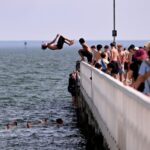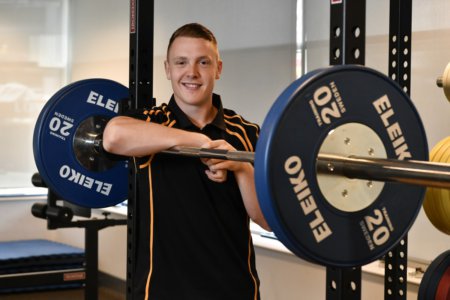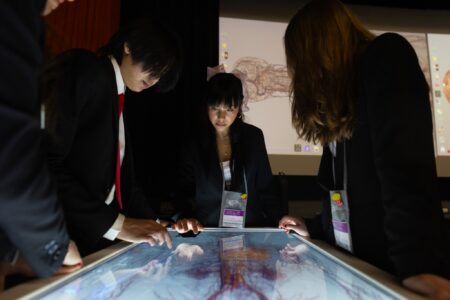
It’s an exciting time to join the fields of kinesiology and sports science. Today, there are more roles than ever before for those interested in human movement, health, and performance. Beyond personal training or coaching, other career paths encompass rehabilitation, exercise physiology, biomechanics, corporate wellness, and so much more.
For example, you may work with athletes to improve performance using motion analysis technology. In clinical settings, you can help patients recover from injuries or surgeries through guided physical therapy. Prefer research? You can explore how exercise affects the body and mind to inform public health policies or fitness guidelines. In business, you can become sports scientists who develop fitness apps, wearable tech, and training programmes.
Whether in clinical, corporate, educational, or research settings, advanced expertise in human movement and performance are in high demand – especially if your master’s or PhD degree are from one of the highly reputable universities below.

Source: University of Regina
University of Regina
Located in the heart of Saskatchewan, the University of Regina (U of R) is well-known for transforming students into graduates who go on to make a real-world impact. U of R graduates are creators, innovators, and problem solvers — people who think big and act with purpose.
Many of them are from the Faculty of Kinesiology and Health Studies, which offers advanced programmes leading to a Master of Science (MSc) and Doctor of Philosophy (PhD) in this field. These programmes cover various areas, including health, exercise and movement sciences, adapted physical activity, sport and recreation management, and leisure studies. As a student here, you will be encouraged to explore meaningful questions that intersect with real-life challenges in health and wellness.
Community involvement is at the heart of much of the faculty’s research. For example, Dr. Tristan Hopper, an associate professor in the Therapeutic Recreation programme, focuses on improving the experiences of youth in recreation settings. “I use community-based participatory methods to develop questions that are meaningful and impactful to both the youth and the communities I work with,” he says.
Similarly, Dr. Michael Dubnewick’s courses prompt students to reflect on their own access to recreation and leisure. He collaborates with Growing Young Movers, an after-school programme that supports Indigenous youth. “It’s one of my favourite spaces to be in — seeing how young people express leadership through their own stories,” he says.
The faculty’s strength lies in how interdisciplinary everything is. With expertise ranging from biomechanics and sport tourism to neurorehabilitation and nutrition, this is where you’ll benefit from varied perspectives and research styles. This diversity equips you with the tools to tackle complex health and wellness issues from multiple angles.
Learn more about the University of Regina.

The School of Exercise and Nutritional Sciences offers programmes in kinesiology, nutrition, athletic training, and exercise physiology. Source: San Diego State University/Facebook
San Diego State University
The School of Exercise and Nutritional Sciences (ENS) at San Diego State University has come a long way since it began in 1914 as a physical education department. Over the years, it has evolved into a forward-looking institution that now offers master’s programmes in athletic training, exercise physiology, food science, and nutritional sciences, as well as a programme leading to concurrent MS degrees in Nutritional Science and Exercise Physiology.
Graduate study at ENS is rooted in research and designed to prepare you for careers in healthcare, the food industry, and academia. Whether working in clinical rehab, with sports teams, or in wellness programmes, you leave with the knowledge and experience to thrive in their fields. Each master’s programme includes a final research project, developed with the support of a faculty mentor, and students are encouraged to engage with faculty early to identify research interests and start their work promptly.
What sets ENS apart is its balance of strong academics and hands-on experience. You’ll gain practical skills in areas like athletic training, fitness, and sports conditioning, guided by faculty who are not only experienced teachers but also active researchers. Their work spans various topics, including biomechanics, exercise physiology, food science, and behavioural nutrition.
This research is supported by modern facilities across the school, including the Biomechanics Laboratory — a hub for cutting-edge studies on human movement. The lab features tools like an 8-camera motion capture system, force-measuring treadmills, virtual reality technology, and ultrasound equipment. Current projects look at injury prevention in athletes and military personnel, fall reduction in older adults, and testing new clinical assessment devices.

As a top-ranked institution, the University of Maryland School of Public Health leads research and education to advance public health knowledge and improve well-being. Source: University of Maryland/Facebook
University of Maryland
The University of Maryland’s School of Public Health has been shaping healthier futures since its founding in 2007. With over 30 academic programmes and accreditation from the Council on Education for Public Health, this is a hub of innovation, research, and learning focused on improving health outcomes across Maryland and beyond.
Faculty and students here are deeply committed to tackling the root causes of health disparities. Whether it’s working with local communities or contributing to global initiatives, the school’s mission is grounded in promoting health, preventing disease, and extending the quality of life. As part of a top-ranked research university, it offers a dynamic environment where curiosity meets impact.
Drawing on the university’s broad interdisciplinary strengths, the school supports research that spans from cells to societies. Faculty-led projects address many public health challenges — from environmental threats and health equity to mental health and family well-being. These take place at its labs and centres, good starting points for anyone seeking collaboration and innovation.
For those looking to make a difference, the school offers several master’s programmes to build practical expertise and leadership in the field. Options include Master of Public Health (MPH), Master of Health Administration (MHA), MS in Environmental Health Sciences or Couple and Family Therapy, and MA in Kinesiology. Dual degrees and an accelerated BS + MPH track also provide flexibility for motivated learners.
Doctoral candidates can dive deeper with specialised PhD programmes across key disciplines like Epidemiology, Family Science, Behavioural and Community Health, and more. With close ties to the Washington, DC area, this is campus where you’ll benefit from mentorship, policy access, and professional networks that prepare you to lead in public health.

At UT Austin’s Department of Kinesiology and Health Education, students and faculty explore human movement, health behaviour, and sports culture through research, internships, and classroom learning. Source: University of Texas at Austin/Facebook
University of Texas at Austin
With more than 51,000 students and 3,000 faculty members, the University of Texas at Austin is one of the largest public universities in the country. Located in the heart of Texas’s capital, it brings together a mix of cultures, people and ideas — great for anyone seeking to be part of the next innovation in health science.
At the Department of Kinesiology and Health Education (KHE), that spirit of innovation is everywhere. The department offers graduate programmes on human movement, health behaviour and sports culture. You’ll be immersed in a hands-on experience thanks to access to modern research labs, expert faculty, and dedicated advisors. Internships and exposure to real-world applications are part of the curriculum, helping you turn theory into practice.
Graduate students can choose from various programmes, including Exercise Physiology, Health Behaviour and Health Education, Kinesiology, Movement and Cognitive Rehabilitation Science, Physical Culture and Sport Studies, and Sport Management. Research-driven and community-oriented, these programmes help students to contribute meaningfully to the fields of sport and health.
Ranked #9 nationally by the National Academy of Kinesiology, the department averages over US$4 million annually in research funding. Grants come from leading institutions like the National Institutes of Health and the National Science Foundation, supporting work that addresses everything from physical activity and rehabilitation to public health and sports history.
Part of what makes KHE unique is how faculty members work across disciplines and sub-disciplines, breaking down silos to collaborate on complex issues. This has led to projects around the globe — from studying exercise physiology in transgender adults in Thailand to designing interventions that tackle type II diabetes and reduce vaping among youth in Texas.
*Some of the institutions featured in this article are commercial partners of Study International










